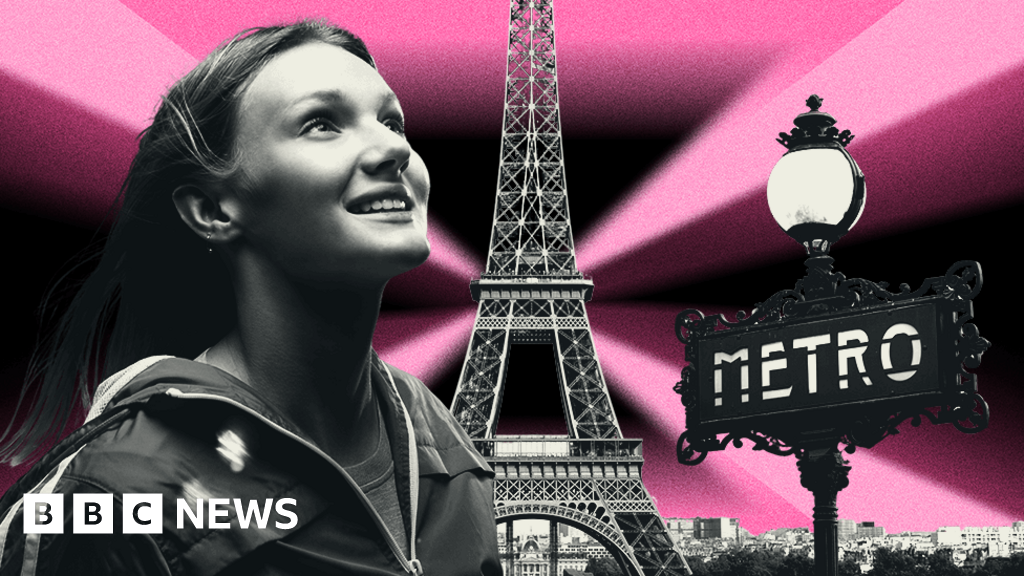 BBC
BBCThe Olympic Games are here again – and this time, the world’s foremost sports competition is taking place only hours away from the UK.
From 26 July to 11 August, Paris will welcome millions of visitors to the games happening across 30 plus venues. Events are also taking place in Lille, Marseille and Tahiti.
Millions of tickets have already been sold but thousands are still up for grabs.
If you’re contemplating a last-minute trip to France to see the games or fancy watching at a fan zone in the UK, here’s what you need to know.
How to get Olympic Games tickets

You can still buy tickets on the official Paris 2024 website.
Over a million tickets were still available in the week leading up to the games. New tickets will also be released on a daily basis throughout the competitions. You can book a seat for the opening ceremony and for multiple sporting events like badminton, rowing and swimming.
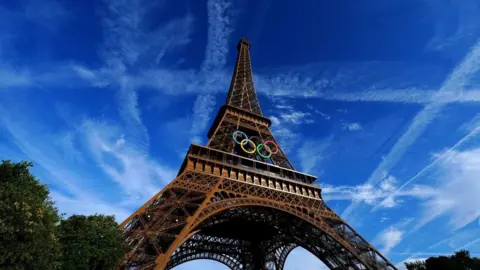 PA
PAPricing starts at $24 (£20) for sporting competitions, although you can get $15 tickets (£13) for some football events if you buy four at once.
At the upper end of ticket prices there are $2,700 (£2,300) “Category A” seats for the opening ceremony – which takes place along the River Seine. “Category C” seats cost slightly less at $900 (£760). Alternatively, you can always watch for free from the upper banks.
Download the Paris 2024 Tickets app to access your ticket QR code. Don’t try to print off tickets and make sure your phone is charged. One account can buy 30 tickets, six per event and four for certain events like ceremonies. The app also allows for ticket resales.
Things go on a first-come, first-served basis, so remember to:
- Check the official Paris 2024 ticket page and resale platform
- Be wary of scam tickets not from the Paris 2024 website, official app or resale platform
- Try to be flexible as some events are sold out
Of course, if you took a 22-hour-flight from London Heathrow through Los Angeles to Tahiti in French Polynesia, you could watch this year’s Olympic surfing competitions for free from the island’s sandy beach.
How to get to Paris

With France just next door, there are plenty of ways to get to the Olympic Games. But a heads up: booking last minute means things will be pricy.
A one-way Eurostar ticket from St Pancras International to Paris Gare du Nord will likely cost £200 or more on the first weekend of the games. If you plan to go in the following weeks, standard tickets range from £195 to £72 one-way. The journey takes roughly two hours and 15 minutes.
The Eurotunnel, an undersea railway for cars and coaches travelling to France, is largely sold out for 26 July. Most tickets are priced at £200 or more one-way, but things get cheaper if you go the week after. The journey takes 35 minutes.
Ferry prices vary greatly depending on your departure date and time. A trip from Dover to Calais leaving on 26 July and returning on 28 July with a standard car is around £200 – £350 for a return ticket. The ferry takes approximately one hour and 30 minutes.
You could always ride a bike instead of taking the car. The ferry ticket will only cost around £25. But it’s a roughly 8-hour-ride from London to Dover and then an 16-hour-ride from Calais to Paris.
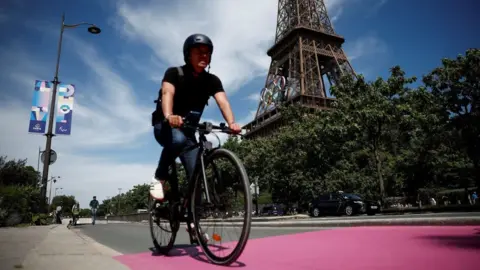 Getty Images
Getty Images Some flights are available from UK airports to Paris. They start at around £200. On 26 July, there are unreserved seats on flights from London, Manchester, Birmingham and Edinburgh. The journey takes approximately one hour 20 minutes.
When you land, there are buses, trains and taxis to get from the airport to Paris city centre.
Where to stay in Paris

Once you’ve sorted a route to France, securing accommodation is the next big task. There are still options available in and around Paris, but expect things to be more expensive than usual.
Airbnb, an official partner of Paris 2024, is a good place to start. On the weekend of 26 to 28 July, Airbnbs are available from around £100 (further away from the city centre) to £200 a night or more. You’ll find roughly similar prices – £100 to £200 per night – for Airbnbs in Marseille or Lille.
Alternatively, you could stay outside the capital in cities like Reims or Rouen and book a slightly cheaper accommodation there. But keep in mind that you’ll have to spend over an hour on the train to get in and out of Paris.
Hotels are another option. You can find a number of available rooms between £100 and £800 a night on the first weekend of the games. However, the average room rate in Paris has more than doubled – up from $299 (£250) to $460 (£390), according to SiteMinder. Across France, the average room rate has jumped from $251 (£210) to $334 (£280).
If you want somewhere to stay for several weeks, you could use a Facebook group to find an apartment to rent out. There are several Paris-based pages, but these groups are not verified.
Getting around Paris

Paris will be extremely busy during the games and venues are spread out around the city.
The easiest and most eco-friendly way to travel is. Every venue has bike access and organisers say there will be thousands of bike parking spots across the city. You can rent bikes from operators like Velib’ Metropole and Veligo as you go.
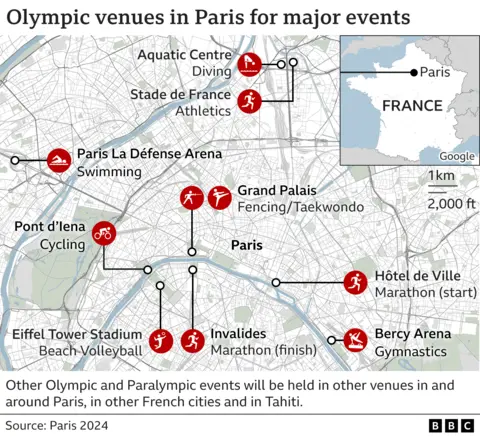
If you need to travel long distances, there are bus and metro options. But fares will double during the games and there are planned closures at some stations. You can use this interactive map to see when stations are closed and to check times when they’ll be overly crowded.
Spectators are advised to download the Paris 2024 Transport App to plan routes and see real-time traffic updates. App users can purchase a Paris 2024 Pass which covers venues across the region. It cost $16 for a day and $70 for seven days.
There will be taxis and Ubers in the capital, but at certain times, security zones will be enforced across different parts of Paris. For example, from 18 to 26 July, areas around the Seine are marked as high security zones and only people with a confirmed booking or Pass Jeux (The Games Pass) can enter.
Fan zones in the city

If you arrive in Paris without a ticket, don’t worry.
Dozens of free fan zones will be set up across the capital, and many are next to iconic landmarks. This includes Champions Park in Trocadero Gardens next to the Eiffel Tower, which opens from 26 July to 10 August. Up to 13,000 fans a day can visit and meet medal-winning athletes, watch sporting events and enjoy several music performances.
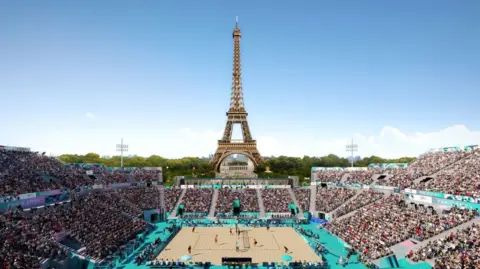 Paris 2024
Paris 2024Another fan zone is L’Hotel de Ville – Paris’ city hall – which has two big screens and a raised terrace where people can watch the sunset over the Seine.
You can also go to sporting events in the heart of the city like the triathlon taking place in the Seine and Champs-Elysees or the marathon between Paris and Versailles.
If you’re keen to get the more traditional Parisian experience, top tourist attractions are open. You can visit The Louvre and Eiffel Tower between games, although there are planned closures at some landmarks so check they’re open before you visit.
Fan zones in the UK

If you don’t fancy a trip abroad, there are several public places to watch the games in the UK.
Team GB are hosting special fan zones with big screens, performances and medal celebrations for returning athletes. They will be set up at:
- London, King’s Cross
- London, Grosvenor Square
- London, Battersea Power Station
- London, White City
- Manchester, Spinningfields
- Edinburgh, St James Quarter
- Bristol, Cabot Circus
- Liverpool, Liverpool ONE
- Birmingham, Bullring
- Southampton, Westquay
Watching from your sofa

BBC One and BBC Two will air over 250 hours of live content as 10,000 athletes compete in 329 gold medal events. There will also be a nightly highlights programme to recap the best bits. BBC iPlayer will have a dedicated live stream, Olympics Extra.
There’s a special Olympic schedule running on BBC Radio 5 Live and , plus a daily podcast on BBC Sounds.
You can also follow competitions on the BBC Sport Website, app and social media channels.
Read more about BBC coverage here.


